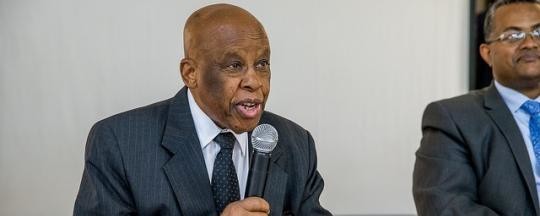Former Botswana President Festus Mogae is expected to reveal today a “compromise proposal” on security arrangements in Juba to ensure the return of SPLM-IO leader Riek Machar to the city to take up his role as first vice president in a new power-sharing government.
Mogae is the chairman of the Joint Monitoring and Evaluation Commission (JMEC), an oversight body that will meet in Juba today to discuss implementation of South Sudan’s August 2015 peace agreement.
According to a text of remarks prepared for the JMEC chairman’s speech at the meeting today, Mogae thinks the absence of a “workable” plan for security arrangements in Juba is the principle obstacle to formation of the new transitional government.
Mogae says he intends “to offer a compromise proposal on security arrangements for Juba, sufficient to ensure security for the return of the First Vice President, and consequently to allow for the formation of the TgoNU [Transitional Government of National Unity].”
The proposal will be circulated at the JMEC meeting in Juba today, where Mogae is expected to ask all parties to endorse the plan.
In his remarks, the JMEC chairman did not provide details of his plan but said it called for the “reasonable and measured” deployment of a group of SPLM/A-IO troops to Juba. Mogae also noted that the government has committed to complete relocation of its designated forces from Juba by 29 February, less than a week away.
If the proposal is endorsed at the JMEC meeting today, international partners will work to put in place the necessary logistics “this very week,” according to Mogae.
Under the terms of the August 2015 peace deal, Juba is slated to be partially demilitarized, but both parties are allowed to keep a limited number of troops in Juba to serve as bodyguards for President Kiir and Machar and to guard existing military installations.
A deal on the specific numbers of SPLA and SPLA-IO troops allowed to remain in Juba was struck last November in talks mediated by envoys of the East African bloc IGAD, before JMEC was fully operational, but the deal did not include details as to the means of deployment of the SPLA-IO troops to Juba, where exactly they would be stationed, etc.
File photo: Festus Mogae




